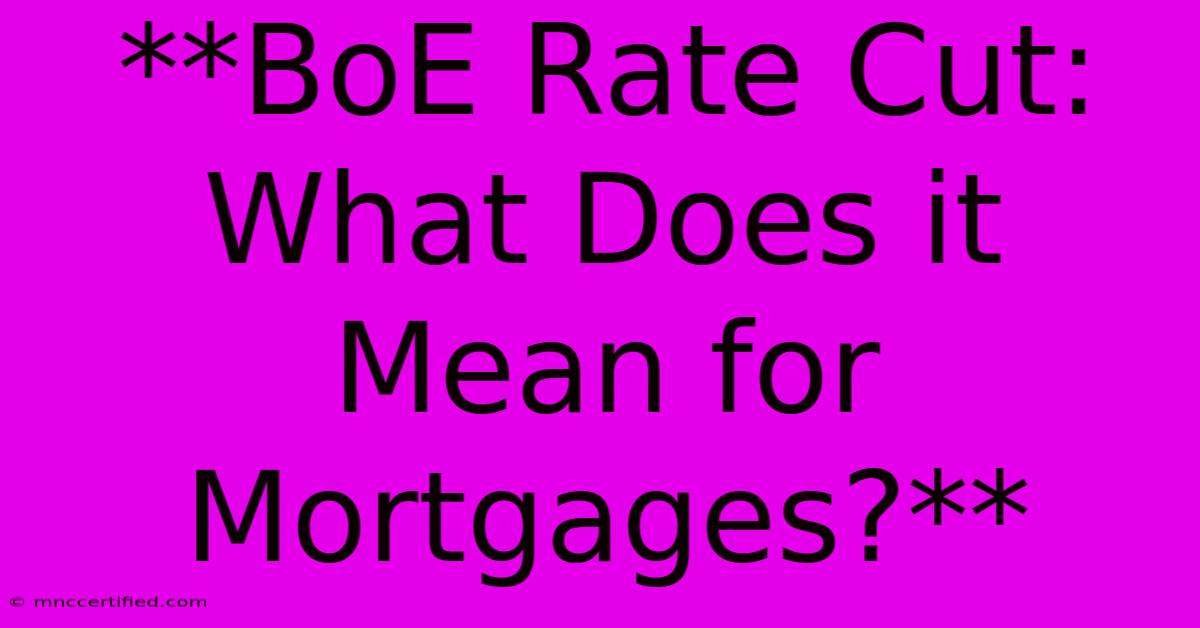**BoE Rate Cut: What Does It Mean For Mortgages?**

Table of Contents
BoE Rate Cut: What Does it Mean for Mortgages?
The Bank of England (BoE) recently announced a rate cut, a move that has sent ripples through the UK's financial landscape. For many, the most pressing question is: how will this impact mortgages?
This article breaks down the implications of the BoE rate cut for mortgage holders and potential borrowers. We'll explore the potential benefits and drawbacks, as well as key considerations for navigating this changing economic environment.
Understanding the BoE Rate Cut
The BoE's decision to lower interest rates aims to stimulate economic growth. By making it cheaper for businesses to borrow money, the theory goes, they will invest more, leading to increased employment and spending.
However, for homeowners, the impact of a rate cut can be less straightforward.
Potential Benefits for Existing Mortgage Holders
Lower Monthly Payments: A rate cut could lead to lower monthly mortgage payments for those with variable-rate mortgages. This is because variable rates are typically tied to the BoE's base rate. A decrease in the base rate means your lender may lower your interest rate, resulting in lower monthly payments.
Increased Equity: As rates fall, your mortgage payments may decrease, allowing you to allocate more money towards paying down your principal. This can lead to faster equity growth in your home.
Potential for Refinancing: A rate cut could create an opportunity to refinance your existing mortgage at a lower rate. This could further reduce your monthly payments and potentially save you a significant amount of money over the life of your mortgage.
Potential Drawbacks for Existing Mortgage Holders
Limited Impact: If you have a fixed-rate mortgage, a BoE rate cut won't directly affect your monthly payments. You'll continue paying the same interest rate until your fixed-rate period ends.
Lower Interest Rates on Savings: While lower mortgage rates are beneficial, it also means lower interest rates on savings accounts. This could potentially eat into your savings growth.
Key Considerations for Potential Mortgage Borrowers
Lower Interest Rates: A rate cut could lead to lower interest rates on new mortgages, which could make buying a home more affordable. However, this can also lead to increased competition in the housing market, potentially driving up home prices.
Potential for Increased Borrowing: With lower interest rates, lenders may become more willing to approve mortgages for larger amounts. This could lead to increased competition among borrowers as everyone seeks to get the best deal.
Navigating the Changing Mortgage Landscape
Do your research: Don't rely solely on news headlines. Speak to your mortgage lender or a financial advisor to understand how the BoE rate cut might impact your specific situation.
Consider your options: If you have a variable-rate mortgage, explore the possibility of switching to a fixed-rate mortgage to lock in a lower rate. If you're considering buying a home, research the current mortgage market and compare rates from different lenders.
Be prepared for potential changes: The housing market can be volatile. Keep abreast of interest rate fluctuations and be ready to adapt your mortgage strategy accordingly.
Conclusion
The BoE rate cut presents both opportunities and challenges for homeowners and potential buyers. While it might lead to lower mortgage payments and increased affordability, it's crucial to understand the full implications and to make informed decisions based on your individual financial circumstances. Consulting with a financial professional can provide valuable insights and guidance in navigating this complex landscape.

Thank you for visiting our website wich cover about **BoE Rate Cut: What Does It Mean For Mortgages?** . We hope the information provided has been useful to you. Feel free to contact us if you have any questions or need further assistance. See you next time and dont miss to bookmark.
Featured Posts
-
Does Homeowners Insurance Cover Ductwork
Nov 08, 2024
-
Cink Takes Early Lead In Schwab Cup
Nov 08, 2024
-
Uk Interest Rates Lowered To 4 75 By Bo E
Nov 08, 2024
-
Del Monte Healthy Snacks With Natural Ingredients
Nov 08, 2024
-
Kimmel Tears Up Over Trump Victory
Nov 08, 2024